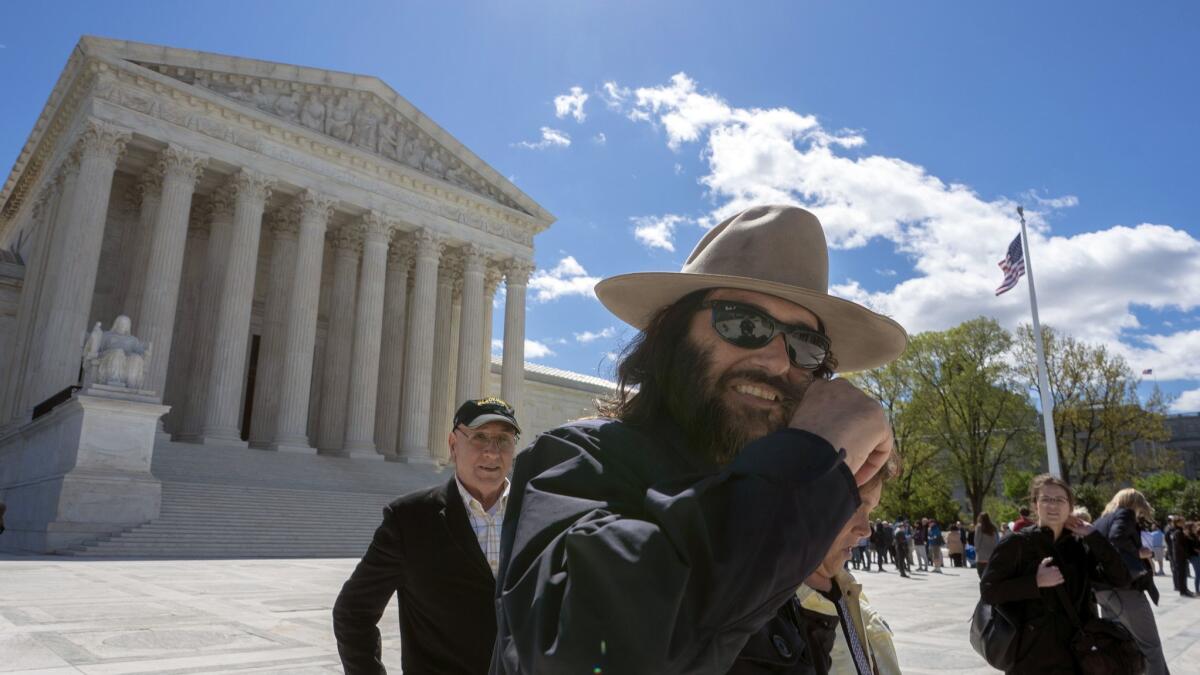Profanity gets a stamp of approval from the Supreme Court

- Share via
Profanity sells. Just ask the film industry.
So when Los Angeles artist Erik Brunetti founded his clothing brand in 1990, he called it “FUCT.” According to the company, the name is an acronym for “Friends U Can’t Trust,” and — wink, wink — is meant to be pronounced letter by letter: F-U-C-T. That’s all well and good, but it doesn’t take a cognitive scientist who studies profanity (like me) to see “FUCT” for what it is.
And that has caused problems for Brunetti. The U.S. Patent and Trademark Office refused to issue a trademark because, it asserted, the name “FUCT” violates a statutory ban on trademarks for “immoral” or “scandalous” material.
That changed Tuesday when the Supreme Court ruled in favor of Brunetti, arguing that the “immoral” and “scandalous” criteria violated Brunetti’s free speech. Free speech cases addressing obscenity are not all that common at the Supreme Court, so they’re always noteworthy, but this ruling builds off another from just two years ago. In that case, the court decided the Patent and Trademark Office had to approve a trademark for the band called the Slants even though the band’s name was also a derogatory term for people of Asian descent. Unless and until Congress passes a new statute, slurs and profanity will be able to be trademarked.
Public spaces are already populated by people exercising their 1st Amendment right to wear obscene and profane clothing.
This has spurred substantial concern. In her dissent in the clothing case, Justice Sonia Sotomayor wrote that the government will now have to register “the most vulgar, profane or obscene words and images imaginable.” Justice Stephen G. Breyer cautioned: “Just think about how you might react if you saw someone wearing a T-shirt or using a product emblazoned with an odious racial epithet.”
But we don’t have to imagine.
Public spaces are already populated by people exercising their 1st Amendment right to wear obscene and profane clothing. Brunetti has been producing clothing imprinted with “FUCT” for almost three decades, and the Slants have been performing under that name since 2006. In an example from our own backyard, T-shirts often appear during the week of the big football game that append “F” to the names of the rival schools — “FUCLA” and “FUSC.”
By almost any estimate, profanity is on the rise. Even though the Supreme Court has continued to uphold the Federal Communications Commission’s right to censor broadcast television and radio, these media are shrinking as they are supplanted by online video streaming, social media, podcasts and gaming, not to mention cable television and satellite radio. All of these have substantially less restrictive guidelines for profanity than the FCC does.
But this has not resulted in the dire consequences that Justices Sotomayor and Breyer warned about. Instead, it has had the opposite effect. Surveys across several generations suggest that the most frequently used profanity, like the offending four-letter word upon which FUCT is bootstrapped, have become less offensive over the last 20 years, particularly among younger Americans. For instance, last year I surveyed 100 UC San Diego students about profanity. They rated the f-word as only the 24th most offensive word in the survey, nestled in between the rather anodyne “bastard” and the somewhat outdated “hooker.” This is a substantial change — consider that in 1972 George Carlin named the f-word one of his “seven dirty words.”
Enter the Fray: First takes on the news of the minute »
In short, familiarity has bred not contempt but indifference. As the barriers to public displays of profanity have fallen, so has the power of the words themselves. An unenforced taboo isn’t really much of a taboo at all. So, if anything, increased use of profanity on trademarked products risks devaluing those very trademarks. Increased exposure will decrease their impact.
Of course, this is all subject to change. The Supreme Court’s opinion left a loophole for Congress. It stated that a more limited statute that only addressed “lewd, sexually explicit and profane” content could potentially be in line with the 1st Amendment. Chief Justice John G. Roberts Jr. agreed. He wrote that the 1st Amendment “does not require the Government to give aid and comfort to those using obscene, vulgar, and profane modes of expression.” In the future, Congress could opt to follow this path and pass a new, narrower statute banning profanity that the court would approve.
That would be a mistake. Not just because a trademark ban would have little effect on the infiltration of profanity into public view. That fight is already over. But because the best way to declaw the harshest language is to expose it to the tireless erosion of repetition.
Benjamin Bergen is a professor of cognitive science at UC San Diego and author of “What the F: What Swearing Reveals About Our Language, Our Brains, and Ourselves.”
More to Read
A cure for the common opinion
Get thought-provoking perspectives with our weekly newsletter.
You may occasionally receive promotional content from the Los Angeles Times.









